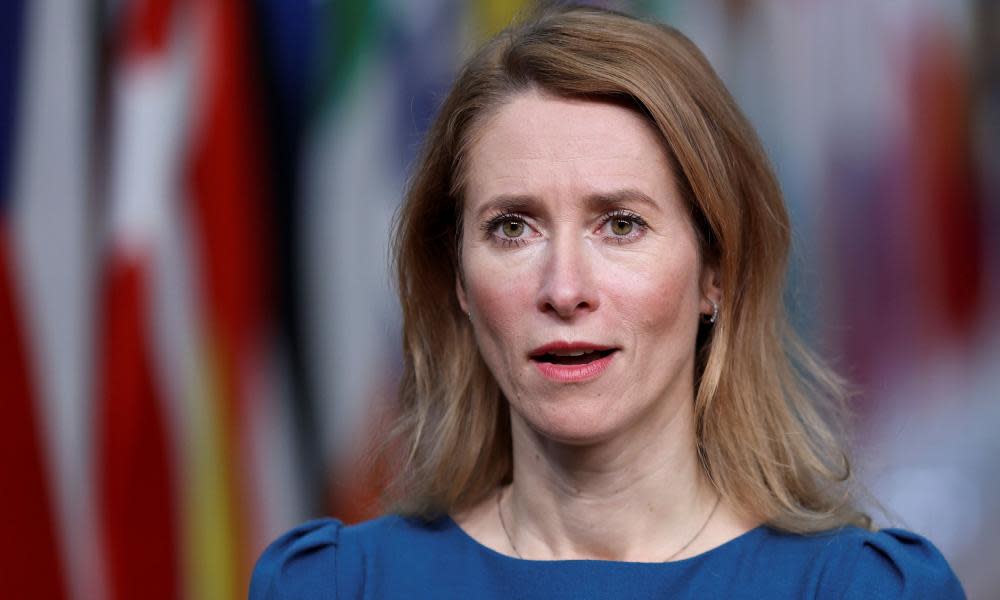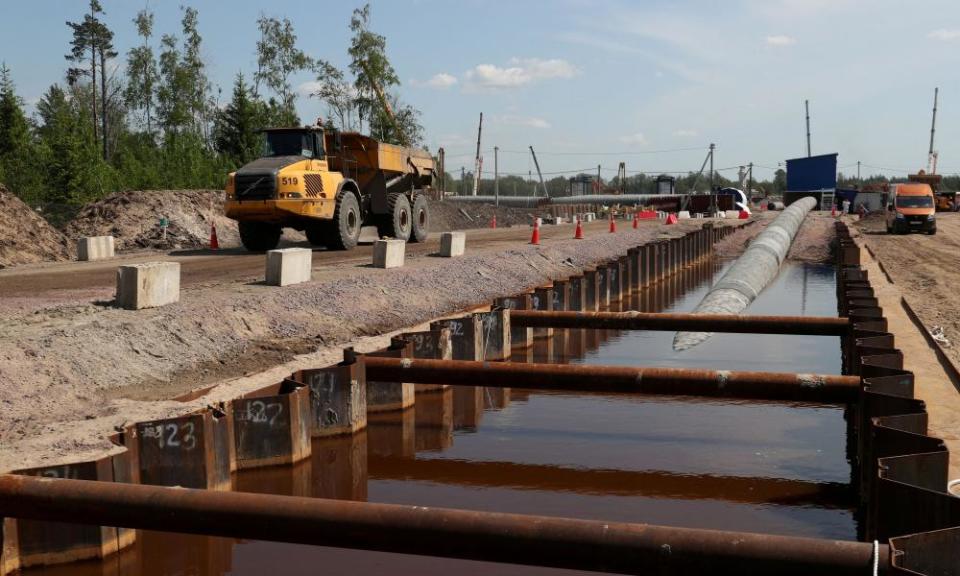‘Putin only understands strength’: Estonian PM on Ukraine tensions

Europe needs to end its reliance on Russian energy and Germany should accept that the Nord Stream 2 pipeline was never just a commercial project, the Estonian prime minister has said in an interview conducted against the backdrop of soaring tensions over Ukraine.
Kaja Kallas also said she detected a wider debate within Germany about its approach to Russia after Angela Merkel’s departure, and questioned Berlin’s ban on transferring Estonian weapons to Ukraine. The ban favours Russian aggression, Kallas said, since the weapons were intended for Ukraine’s self-defence.
She said she accepted Germany’s right to impose the ban on the transfer of Howitzers on the basis of Germany’s longstanding policy against exporting weapons to conflict zones, but confirmed discussions are still live and the ban may yet be lifted.
Kallas, who took office in January 2021, is the daughter of the former prime minister Siim Kallas. Her mother and grandmother spent time in Siberian gulags during the mass Soviet deportations from Estonia during the second world war.
In recent weeks she has become one of the most forthright advocates in the west of the argument that Vladimir Putin only responds to shows of strength. She said the Russian president’s demands that Nato returns to its pre-1997 borders put her country’s future at stake. Estonia, in common with the other Baltic states, joined Nato in 2004 and is protected by the alliance’s article 5 joint self-defence clause.
Russia
Army: 280,000, including 2,840 tanks and 6,920 fighting vehicles; 150 Iskander ballistic missiles; 4,684+ artillery; 1,520 surface-to-air batteries.
Navy (just the Black Sea fleet): 6 submarines; 6 warships; 35 patrol ships.
Air force: 1,160 combat planes, 394 attack helicopters, 714 air defence systems.
Ukraine
Army: 145,000, including 858 tanks and 1,184 fighting vehicles; 90 Tochka ballistic missiles; 1,818 artillery; 75+ surface-to-air batteries.
Navy: 1 warship, 12 patrol and coastal ships.
Air force: 125 combat planes, 35 attack helicopters; 6 medium TB2 drones; 322 air defence systems.
Source: International Institute of Strategic Studies
Her longstanding call for extra troops to be posted in Estonia, including substantial US presence, is likely to be answered shortly. A group of five F15s landed in Estonia this week, part of a wider strengthening of Nato’s eastern flank. “It is quite a deterrent if you plan an attack on a country where US troops are based. If a big bully is threatening you, it is good to have big friends,” she said.
She said clear signals were now emerging from Germany’s leaders that the Nord Stream 2 pipeline from Russia to Germany will not go ahead if Russia invades Ukraine and that she wanted the pipeline permanently abandoned.
Related: German intelligence chief: Russia has not decided whether to attack Ukraine
“We have been saying for years that Nord Stream is a geopolitical project not an economic one,” Kallas said. “If you are connected to someone, then the person on the other side of the connection can hurt you. It is not of benefit to Europe, or European energy security. These connections can be destabilising.
“We in Europe have been talking about dependence on Russian gas for quite some years already, but if you look at the numbers, the dependence on Russia has been increasing not decreasing. It is a big worry. Europe has to increase its independence from Russian gas. It is so important.”
On Estonia’s proposed transfer of German-origin Howitzer weapons to Ukraine she trod carefully, but said it was wrong to think a ban represented a simple contribution to a de-escalation. “Ukraine has no intention of attacking Russia,” she said. “They need arms to protect their country. These are defensive weapons to be used against an aggressor.”
She said she was following the debate in Germany closely about its security role and relations with Russia. “We have a new government. Everyone is trying to figure out where it will go. Germany is a big player and Merkel a long-time leader, and everyone knew how she operated and what her positions were. It was more predictable. Any change of government – I would not call it a mess – but there is an interim time before a government starts to run properly.”

“This is a broader test for the west and much broader than just Ukraine. Putin only understands strength, and Russia’s goal has always been to divide the west, the EU and Nato.”
Kallas said there was a very clear pattern to Russian negotiations and it was best summed up by the former Soviet foreign minister Andrei Gromyko. “He said there are three basic rules of negotiating with the west. First demand the maximum, do not meekly ask, but demand. Second present ultimatums and third do not give one inch of ground because there will always be someone in the west that will offer you something maybe half that you did not previously have. It is so characteristic of how they operate.
“We are already discussing what we can offer to de-escalate, and if we do that the west will fall into their trap. Nato has not caused this crisis and is not planning to attack anybody. Nato cannot do anything on its side to de-escalate. We should not take any expensive steps so they end up with something they did not have before.”
Kallas said that did not mean she opposed dialogue and that she was happy to see talks about transparency on military capabilities, even if she was “very doubtful that Russia will keep its side”.
But she said she saw no sign of concessions being made by Nato in its discussions with Russia. “The level of consultation on the Nato side has been excellent. Being a small country of 1.3 million people, it is easy for the big ones only to consult amongst themselves, and go over our heads, but this has not happened. Overall the level of unity we have shown will have surprised Putin.”

 Yahoo News
Yahoo News 
